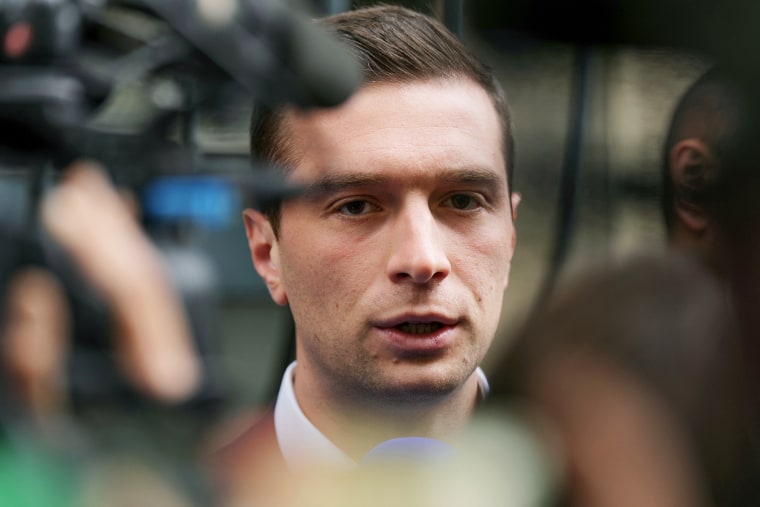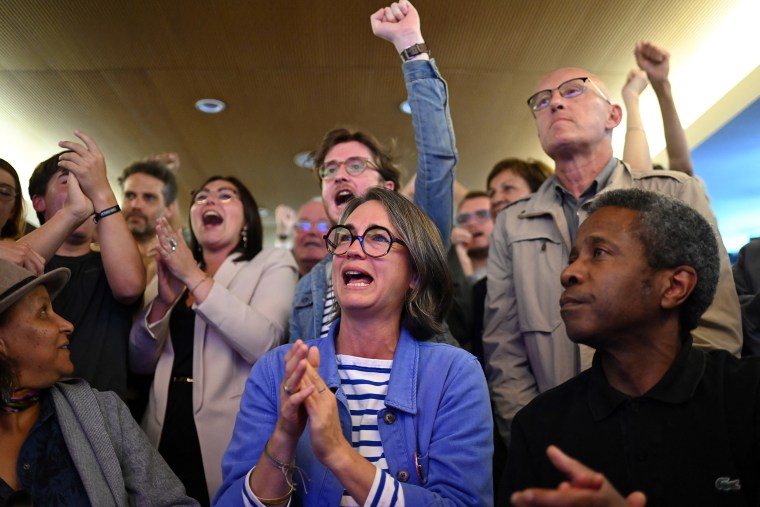One word encapsulates French politics after last week’s parliamentary elections: impasse.
Marine Le Pen’s far-right National Rally failed to gain a majority — but neither did the leftist alliance New Popular Front nor the centrists of President Emmanuel Macron.
With the 2024 Paris Olympics fast approaching, the result is a divided Parliament, which could lead to months of political maneuvering and painstaking negotiations to secure a coalition government in a country with no recent history of bipartisan power-sharing.
Meanwhile, the far right has not gone away. Le Pen will likely be focusing on France’s biggest political prize: the 2027 presidential election.
Here’s what to know:
The French political system has never been in this situation before. After the second round of legislative elections, no party won a majority 289 seats out of 577 seats in the National Assembly, the French equivalent of the U.S. House of Representatives.
The New Popular Front, a broad leftist alliance comprising the radical France Unbowed along with communists, greens and moderate socialists, achieved the best result.
But the 182 seats it won were still far short of the number needed to govern. The centrist coalition of Macron, a group called Together for the Republic, came second with 168.
Although these centrists and leftists had teamed up and agreed to endorse each other’s candidates where necessary, the National Rally — a populist rebranding of France’s old National Front party — came third with 143 seats.
Led by 28-year-old Jordan Bardella, the party had looked set to win outright following the first round of voting last month. But the tactical-voting agreement, known as the “cordon sanitaire,” or “Republican front,” held during Sunday’s second round and the far right was blocked.

“There is a danger in France” of a far-right victory so “we need to vote,” one Parisian, Anne Boudin, 58, told NBC News on Sunday as she went to cast her ballot in the contest’s second round.
Many were similarly compelled and the voter turnout of 67.1% was the highest in decades.
Though the political mainstream had not won, it had not lost either and some claimed an important victory.
“No absolute majority can be led by the extremes, thanks to our determination and the strength of our values,” Prime Minister Gabriel Attal said in a speech outside his official Paris residence, Hôtel Matignon, on Sunday evening.
“We owe it to this French spirit.” added Attal, who made it made clear that he disagreed with Macron’s decision to call the surprise elections.
His offer to resign after the second round of voting was nonetheless refused by Macron. Instead, Macron asked Attal, whom he named as prime minister just seven months ago, to carry on at the head of a caretaker government until a coalition is formed, “in order to ensure the country’s stability.”
So who governs?
Because no one won a majority of seats, France has what’s known as a hung parliament. This means the parties will have to work together — either informally or as part of a coalition — if they want to get anything done.
It’s far from certain whether they will be able to do this. As in the United States, French politics is polarized over issues such as immigration and taxes. And unlike in neighboring Germany and elsewhere, there is no culture of bipartisan power-sharing here.

That’s partly because the French system was designed so that the prime minister and Parliament would enforce the will of the more powerful president, according to Jonathan Eyal, international director at the Royal United Services Institute, a London-based think tank.
There’s no playbook for what happens if these forces are fighting against each other, he said.
“Even if there were a coalition, it’s not clear how it would work,” Eyal added.
Veteran socialist firebrand Jean-Luc Mélenchon, 72, demanded Sunday that Macron appoint a prime minister from his New Popular Front alliance. But Macron has previously refused to work with Mélenchon or the hard-left faction he represents, calling them “extremists.”
Macron could try to form a coalition with other more moderate elements of this alliance. Last week he ditched a policy curbing workers’ social security payments, seen by many to be a mid-election olive branch to progressives.
“That’s the only way I can see them forming a government,” Eyal said. “But Mélenchon is not going to allow himself to be outmaneuvered easily, so we can expect quite a bit of a tussle.”
If no coalition can be formed, the parties will have to try to pass legislation on a case-by-case basis — a high-wire act whose failure would result in an impasse, perhaps even diminishing France’s influence on the European and global stage.
What comes next?
Macron was not up for election this time and will stay on until his second and final presidential term ends in 2027.
Even if he does manage to cobble together a government, it will be hard for Macron to pursue his pro-business agenda. Likewise, the leftists with their hopes of raising the minimum wage and freezing energy prices.
In the short term, opponents of the far-right are claiming at least some semblance of victory. But few are kidding themselves that this is the end of the debate. Le Pen’s party won just eight seats in 2017, a rise that if continued will deliver it into power within the decade.
“The tide is rising,” Le Pen said following Sunday’s result. “It didn’t rise high enough this time, but it’s still rising and, as a result, our victory is only deferred.”








Recent Comments